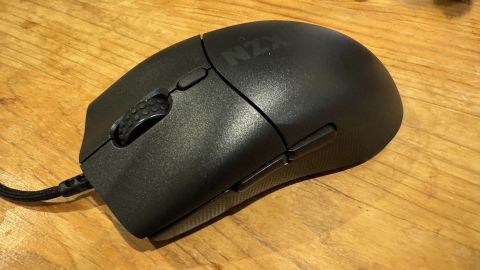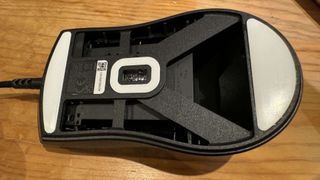Our Verdict
The NZXT Lift 2 Symm may not look like much but it packs a punch in terms of performance, especially for its budget price point. It sheds a little weight off its predecessor's design, though does come away feeling a little cheap for it.
For
- High polling rate
- Lightweight feel
- Competitive pricing
Against
- Basic build quality
- Feels kind of cheap
PC Gamer's got your back
You would be forgiven for thinking you need to splash a ton of cash for a high-end lightweight mouse in the competitive gaming scene, but that's evidently not the case with the NZXT Lift 2 Symm. This pointer delivers a no-frills yet highly concentrated user experience, which means, while it's unlikely to blow you away at any point, it does exactly what it sets out to.
NZXT has been smart to keep the pricing of the NZXT Lift 2 Symm aggressive along with its predecessor, while also shifting some of its weight in the process. While the original Lift mouse clocked in at still-fairly-slight 67g, this new iteration cuts its heft down to just 58g, but that hasn't been without its sacrifices. Namely, the RGB lighting is completely gone for both the Symm and Ergo variants, and the bottom's been hollowed out to its bare essentials.
Short of poking some holes in its back, NZXT has made the lightest mouse that it could, and beefed it up with a staggering 8,000 Hz polling rate combined with a lightning fast 26,000 DPI sensor. Those specs alone are fast enough to put the frighteners on even the best gaming mouse, before factoring in the price point. You can expect to spend $50 for the Symm (etrical) and Ergo (right-handed) versions in either white or black. There's also a Starfield variant for $60 which adds the Constellation badge and colorscheme for an extra $10.
Now, the NZXT Lift 2 Symm is far from the first gaming mouse to offer an 8,000 Hz polling rate, with a popular favorite in the esports scene being the Razer Viper 8K Hz from a handful of years ago. As a long-time user of that mouse and someone who became very used to the enhanced polling rate offered over some other pointers on the market, I didn't find the Lift 2 an upgrade but more of a side-step, with largely the same problems.
The simple fact of the matter is, when you build a gaming mouse around its lightweight nature and shed as many features as possible, you're going to end up with a pointer that subsequently feels cheap. The NZXT Lift 2 Symm has a lightweight frame but it feels more like a toy in my hand than other similarly weighted mice I've used in the past. It isn't helped by a strangely textured scroll wheel which doesn't feel all too fluid when actively scrolling. Things are precise, but not quite as smooth as what I'm used to.
Then we get into the weeds of the NZXT Lift 2 Symm's design, and there's a lot to praise, from the optical switches (rated with a 100-million click lifetime) to the "100% virgin" PTFE mouse feet. Simply put, this gaming mouse glides along my mousepad well with no resistance, which is particularly impressive given that it's a wired pointer. I've primarily used wireless mice for the last handful of years, but the 2m braided cable here gave no pull or dragging of any kind in all my hours in use—you shouldn't need an anchor here.




The Lift 2 Symm variant specifically has a symmetrical shape which makes it ideal for both the claw and fingertip grips. I'm firmly in the latter camp and had no issues of guiding the mouse whether I was working or engaging in some FPS action. Within a couple of minutes after plugging in, I was reliably scoring headshots on beast and man alike in Far Cry Primal and had little issue in holding my own after a couple close games of The Finals and Overwatch 2 after hours.
✅ You want good value for money: This gaming mouse features a high-DPI sensor and a leading polling rate rarely found in gaming mice around the $50 mark.
✅ You play competitive titles: The Lift 2s Symm's 8,000 Hz polling rate offers fast speeds and low latency making it ideal for those wanting to score some clean headshots in today's Esports scene.
❌ You want a wireless gaming mouse: While the cable's unlikely to get in your way, it's not going to be ideal for everyone, and NZXT don't do a version that cuts the cord yet.
As touched upon above, things are about as basic as you can get with this particular gaming mouse, with software also playing a minimal role. You have onboard memory with the Lift 2 Symm able to save your custom profiles to the device via the NXZT Cam software. There's a total of five profiles you can copy over, each with five settings a piece with DPIs ranging from 100 all the way to 26,000. I usually play with the highest DPI settings available, barely moving my wrist, and I was well-catered here.
Overall, the NZXT Lift 2 Symm is a great gaming mouse with a competitive price point, excellent polling rate, good sensor, and solid enough design. The brand has clearly gone for function over flashiness and while this pointer is unlikely to turn many heads, it may just win you a couple of online games yet. I haven't used many mice that are this good for under $50, so if you're cash-strapped but don't want to skimp, the Lift 2 Symm could be the right pick for you.
The NZXT Lift 2 Symm may not look like much but it packs a punch in terms of performance, especially for its budget price point. It sheds a little weight off its predecessor's design, though does come away feeling a little cheap for it.
Aleksha McLoughlin is a very experienced hardware writer, having worked for multiple publications over the years. She has looked after buying guides, writes hardware reviews, news, and features and has managed the Techradar Gaming hardware team in a previous role. Before joining TRG she was the Hardware Editor for sister publication GamesRadar+ and she has also been PC Guide's Hardware Specialist. She has also contributed hardware content to the likes of Trusted Reviews, The Metro, Expert Reviews, and Android Central. When she isn't working, you'll often find her in mosh pits at metal gigs and festivals or listening to whatever new black and death metal has debuted that week.

